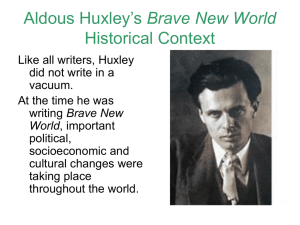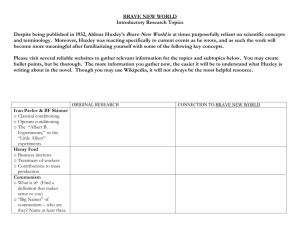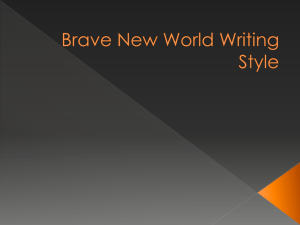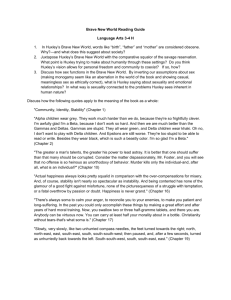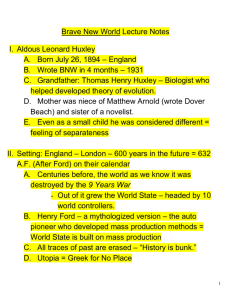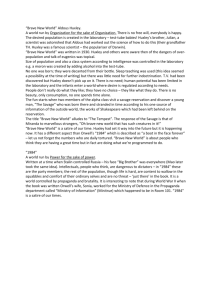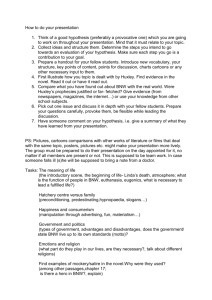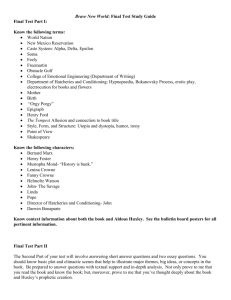Brave New World
advertisement
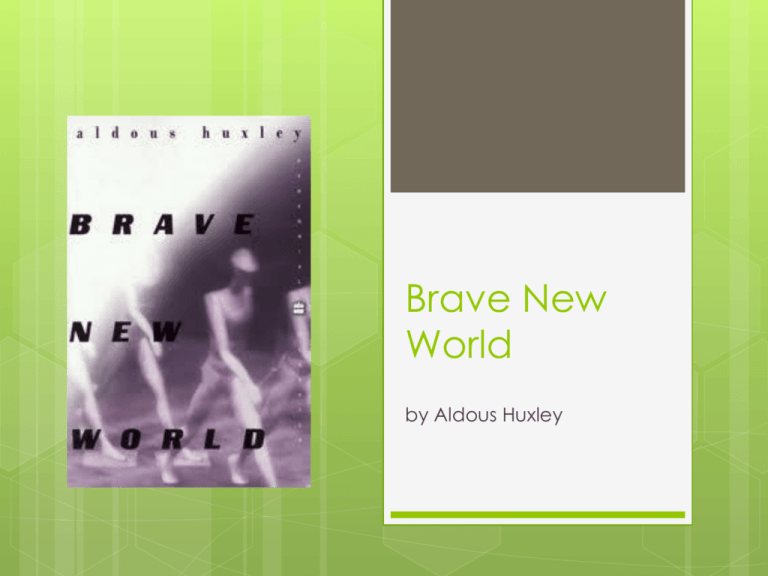
Brave New World by Aldous Huxley Title: Brave New World The title, Brave New World, comes from Shakespeare’s last play, The Tempest, V, I, 181-184 . Exiled from Milan, the former duke Prospero and his admirable fifteen-year-old daughter Miranda have been stranded for twelve years on an uncharted isle in the Mediterranean. Miranda's entire experience of mankind has, until very recently, encompassed only her bitter old dad and his deformed slave Caliban. She is astounded when she meets the young and beautiful Ferdinand for the first time: Miranda: O wonder! How many goodly creatures are there here! How beauteous mankind is! O brave new world That has such people in't! Prospero: 'Tis new to thee. Science Fiction Compilation https://www.youtube.com/watch?v=hbJr qZaB4oI&index=3&list=PLgUG_D0PZyVCNu 3RnECYqTT5nb936Uij3 Quickwrite #1: Why do many science fiction books and movies often depict the future in a very dark manner? Why do many science fiction books and movies use technology as a central part of the main conflict in the story? Why is the government in a science fiction book or movie very often a totalitarian (having total control) government? Quickwrite #2 HW: What is conformity? List some ways that teens conform, using complete sentences. Your statements may start with comments like: “Almost everybody wears…,” “On weekends, most teens…,” or “Many teens listen to music that…” What behavior make certain teens “outcasts”? List some examples from history that show conformity can be a good idea. List some examples of when conformity had negative effects. Would you rather be thought of as a conformist or a non-conformist? Why? Dead Poet’s Society https://www.youtube.com/watch?v=v7i1 7LAP61A&list=PLgUG_D0PZyVCNu3RnECY qTT5nb936Uij3&index=2 Brave New World Slogans: I do love flying. I do love having new clothes. Ending is better than mending. The more stitches, the less riches. Take a holiday from reality. A gramme is better than a damn. ***What do these slogans tell you about the Brave New World? Aldous Huxley in L.A. in1932 Aldous Huxley Born on July 26, 1894, in Godalming, Surrey, in the southeast of England Third son of Dr. Leonard Huxley and Julia Arnold His father was a writer and schoolmaster (principal) His mother founded Prior’s Field School, a private school Grandson of Thomas Henry Huxley, an important biologist who developed a theory on evolution Nephew to Mrs. Humphrey Ward, a famous Victorian novelist Her father was Matthew Arnold, a famous poet Aldous's mother was the granddaughter of Thomas Arnold, a famous educator Julian Huxley, his brother, was a great zoologist, also the first director of UNESCO Questions What can you guess would be Huxley’s interests and background, based on his relatives and upbringing? England is a society based on class. Although this is quickly changing in the 1920’s and 1930’s, class would be very important when Huxley wrote Brave New World. In what class do you think Huxley grew up? Why? Aldous Huxley Many Europeans desired to visit or live in Southern California at this time. However, when Huxley visited Los Angeles in 1932, he became very judgmental about the people and the lifestyles that he observed there. He did gain a fascination about [Native Americans] when he visited an Indian Reservation on his journey to the South West. Ironically, Huxley moved to Los Angeles in 1937. Aldous Huxley Huxley visited Los Angeles in 1932. Many people in Europe desired to visit or live in Southern California at this time. However, Huxley did not enjoy the life styles he observed during his visit. He was very interested in the Indian Reservations that he journeyed to in the South West; however, he was quite judgmental about the people in Los Angeles and their lifestyle. Huxley Interviewed by Mike Wallace http://www.youtube.com/watch?v=1ePNG a0m3XA 1. What does Huxley say is a threat to our freedom and why? Background on BNW Themes Henry Ford Devised mass production for factory assembly lines Made cars more quickly and more cheaply Revolutionized factories Henry Ford at Work http://app.discoveryeducation.com/player /view/assetGuid/A20C183C-D50B-489B878E-B343284BB786 Questions: Why do you think Huxley has his characters in BNW worshipping Henry Ford? Why do you think Huxley has his characters use a T as a symbol to depict their religion? Fordlandia Ford intended to use Fordlândia to provide his company with a source of rubber for the tires on Ford cars, avoiding the dependence on British (Malayan) rubber. The land was hilly, rocky and infertile. None of Ford's managers had the requisite knowledge of tropical agriculture. The rubber trees, packed closely together in plantations, as opposed to being widely spaced in the jungle, were easy prey for disease,2] a problem absent from the Asian rubber plantations, where there were no natural predators. The mostly indigenous workers on the plantations, given unfamiliar food such as hamburgers and forced to live in American-style housing, disliked the way they were treated—they had to wear ID badges, and work through the middle of the day under the tropical sun—and would often refuse to work. In 1930 the native workers revolted against the managers, many of whom fled into the jungle for a few days until the Brazilian Army arrived and the revolt ended.[3] Ford forbade alcohol, women and tobacco within the town, including inside the workers' own homes. The inhabitants circumvented this prohibition by paddling out to merchant riverboats moored beyond town jurisdiction[4] and a settlement was established five miles upstream on the "Island of Innocence" with bars, nightclubs and brothels. 1920’s Modernity Change Cars Millionaires Radios Scene from Cabaret http://www.youtube.com/watch?v=rkRIbUT 6u7Q Background on BNW Themes: 1920’s The 1920’s were a great time of change: World War I, The Russian Revolution, and the Great Influenza Pandemic that killed millions of people worldwide, 1918-1919, were all over. Workers were unionizing, fighting for better pay and better work conditions. Henry Ford’s Model T revolutionized factories— and made cars available to the common man because faster production brought down costs More millionaires existed than ever before Background on BNW Themes: 1920’s The 1920’s also brought great excess: In The Great Gatsby, F. Scott Fitzgerald exposed the excesses of the 1920s—a prosperous age in which many Americans came to enjoy the blessings of consumerism and excess, only to see it all crash around them with the Great Depression that arrived in 1929. Fitzgerald depicted people in the 1920’s as impetuous, drinking too much, and prone to bouts of serious depression and self-destructive behavior. Background on BNW Themes: 1920’s The 1920’s – an era of excess Prohibition in U.S. – Drinking is moved to speakeasies Music – Less refined, more modern Dance – The Charleston Women’s clothing – The flapper; much shorter and more revealing Wealth – More millionaires than ever before (first “bubble”) Consumerism: People have more money, so they purchase more items, helping the American economy grow Cars and radios (technology expanding) Science becomes more important Background on BNW Themes: 1920’s The 1920’s – an era of excess The word “hedonism” was used to describe people’s life styles in the 1920’s: Fast-paced Life lived on the edge People getting drunk and partying nightly When money came in, it often went out just as quickly Lack of care for what was “right” or “wrong” A freedom that often went beyond the boundaries of good taste or propriety (what was proper—again, think of The Great Gatsby) The Great Gatsby (2012) https://www.youtube.com/watch?v=rAR N6agiW7o ***How does this clip connect with what Huxley was saying about hedonism? 1920’s and Consumerism “Every time you spend money, you’re casting a vote for the kind of world you want.” --Anne Lappé American writer, speaker, and activist What do you think this quote means? Why might it be relevant today? 1920’s and Consumerism Huxley parodies the old phrase “a stitch in time saves nine” (mend your clothing now so you don’t have to mend it more later—or spend money replacing it) by using the hypnopaedic jingles: “The more stitches, the less riches” “Ending is better than mending” “A gramme in time saves nine” What do these phrases now mean upon learning the role hedonism and consumerism played in the 1920’s? Questions: How might the concept of a society dealing with quick-paced change play a role in a science fiction novel? How might Huxley comment on us today—with our consumerism, our love of technology, our devotion to partying, our desire to have more and spend more, our “hedonism”? Background on BNW Themes: Govt. Utopian Society Perfect, desirable, happy society—all of society’s problems have been solved Dystopian Society Undesirable, nightmare society where life is as difficult and unhappy as it could be (often the result of an attempt to create a utopia, like postRevolution Russia) Futuristic Society BNW was written in 1931, but takes place in AD 2540 (632 A.F. in the book) Questions Why set the book so far into the future (2540)? This book was created as a warning to people in 1931. Which is going to be more persuasive as a warning—a dystopian society or a utopian society? How will you know the difference between the two? When the Model T had only been created 12 years before and was considered the greatest advancement at the time—in technology, production, and cost—what do you expect the technology to look like in this futuristic society? Background on BNW Themes: Govt. Totalitarian Government Political system where the state holds total authority over the society and seeks to control all aspects of public and private life Fascist Government Form of radical authoritarian nationalism, often totalitarian Socialist Government Economic system characterized by social ownership of the means of production and co-operative management of the economy Communist Government Revolutionary socialist movement to create a classless, moneyless and stateless social order structured upon common ownership Democratic Government Rule by the people, for the people, of the people Background on BNW Themes: 1920’s and Government Karl Marx said: Religion is the sigh of the oppressed creature, the heart of a heartless world, and the soul of soulless conditions. It is the opium of the people. 1. What does the quote mean? 2. Why would Marx, a man who devised a new social order (communism) (A)discuss religion? and (B)view religion in this way? 3. Why did Huxley create a new religion? Why did he create the religion that he did? 4. What comment is Huxley making about religion and about people in the1930’s? DAS KAPITAL by Karl Marx Chapter 1 COMMODITIES SECTION I – THE TWO FACTORS OF A COMMODITY: USE-VALUE AND VALUE (THE SUBSTANCE OF VALUE AND THE MAGNITUDE OF VALUE) The wealth of these societies in which the capitalist mode of production prevails, presents itself as “an immense accumulation of commodities,” its unit being a single commodity… A commodity is, in the first place, an object outside us, a thing that by its properties satisfies human wants of some sort or another. The nature of such wants, whether, for instance, they spring from the stomach or from fancy, makes no difference. Neither are we here concerned to know how the object satisfies these wants, whether directly as means of subsistence, or indirectly as means of production. The utility of a thing makes it a use-value. But this utility is not a thing of air. Being limited by the physical properties of the commodity, it has no existence apart from that commodity. A commodity, such as iron, corn, or a diamond, is therefore, so far as it is a material thing, a use-value, something useful. This property of a commodity is independent of the amount of labor required to appropriate its useful qualities. When treating of usevalue, we always assume to be dealing with definite quantities, such as dozens of watches, yards of linen, or tons of iron. The use-values of commodities furnish the material for a special study, that of the commercial knowledge of commodities. Use-values become a reality only by use or consumption: they also constitute the substance of all wealth, whatever may be the social form of that wealth. In the form of society we are about to consider, they are, in addition, the material depositories of exchange value. Exchange value, at first sight, presents itself as a quantitative relation, as the proportion in which values in use of one sort are exchanged for those of another sort, a relation constantly changing with time and place. Hence exchange value appears to be something accidental and purely relative, i.e., an exchange value that is inseparably connected with, inherent in commodities, seems a contradiction in terms. CAPITALISM Karl Marx talks about commodity in his first chapter of his famous book, Das Kapital. What does “commodity” mean? What has Huxley turned into a commodity in the book Brave New World? Why has he turned these “things” into commodities—what is his message by doing so? IRONY Irony – when a writer says one thing but means something quite different; a literary device in which a discrepancy of meaning is masked beneath the surface of the language Satire – writing that makes fun of, ridicules, or holds up to contempt the faults of individuals, groups, or governments (a form of irony) Understatement – an ironic figure of speech that deliberately describes something in a way that is less than the true case Sarcasm – a conspicuously bitter form of irony in which the ironic statement is designed to hurt or mock its target John Characters in BNW (no last name but called: John the Savage) Bernard Marx Helmholtz Watson Lenina Crowne Mustapha Mond Fanny Crowne Henry Foster Linda (John’s mother—no last name) The Director The Arch-Community-Songster Popé The Warden Characters in BNW John the Savage sounds like John the Baptist (the voice in the wilderness) (John = the beloved one) Bernard (brave as a bear) Marx (Karl Marx) Helmholtz (famous physicist) Watson (Dr. Watson) Lenina (take-off on Lenin) Crowne (British rule-monarchy) Mustapha (The Chosen One - Mustafa Ataturk-Turkey) Mond (world in French) Fanny (female sexual part) Crowne (form of British rule; also same as Lenina—only 1000 surnames; all created alike) Henry (German- home ruler ; Ford’s name)Foster (nurture) Linda (common name—means pretty in Spanish) The Director (leader—totalitarian) The Arch-Community-Songster (like a kantor) Popé (take off on Pope and poppy) The Warden (sounds like a prison warden) BNW: Chapter 1 “A SQUAT grey building of only thirty-four stories. Over the main entrance the words, CENTRAL LONDON HATCHERY AND CONDITIONING CENTRE, and, in a shield, the World State's motto, COMMUNITY, IDENTITY, STABILITY.” What jumps out at you from this first paragraph of the novel? What do you think happens at the CENTRAL LONDON HATCHERY AND CONDITIONING CENTRE? What do you think the “World State” is? What does the motto, “COMMUNITY, IDENTITY, STABILITY,” mean? BNW: Chapter 1, cont. “The enormous room on the ground floor faced towards the north. Cold for all the summer beyond the panes, for all the tropical heat of the room itself, a harsh thin light glared through the windows, hungrily seeking some draped lay figure, some pallid shape of academic goose-flesh, but finding only the glass and nickel and bleakly shining porcelain of a laboratory. Wintriness responded to wintriness. The overalls of the workers were white, their hands gloved with a pale corpse-colored rubber. The light was frozen, dead, a ghost. Only from the yellow barrels of the microscopes did it borrow a certain rich and living substance, lying along the polished tubes like butter, streak after luscious streak in long recession down the work tables. What words jump out at you from this description? What images are created by the diction? What is described as alive? What is described as dead? What is the effect of the descriptions (tone, attitude)? Film: Brave New World https://www.youtube.com/watch?v=WuiaT 0nX9ls Brave New World Now, can you identify what each book cover is showing from the book, Brave New World?
